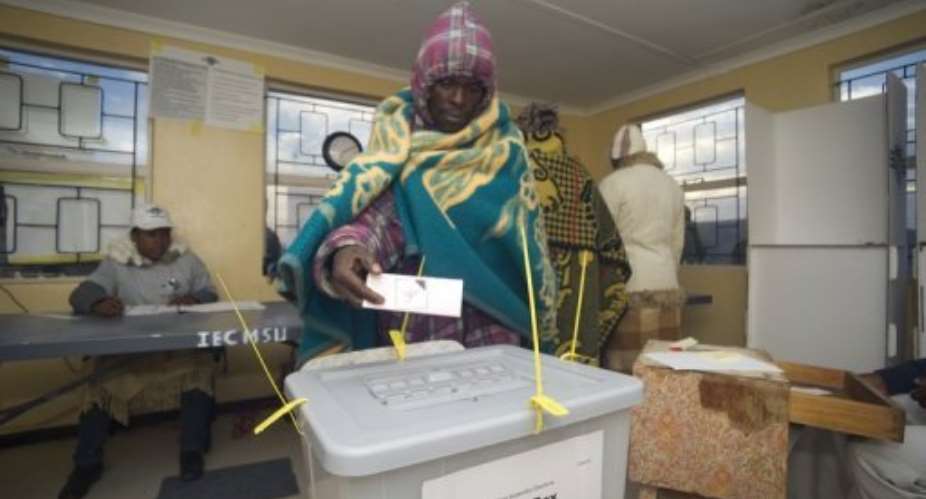MASERU (AFP) - Lesotho counted ballots Saturday after a tight general election -- dominated by personal clashes rather than concerns over poverty -- that could produce the southern African nation's first coalition government.
Voting unfolded smoothly across the tiny kingdom where most people live as farmers in villages separated by towering mountain ranges, which many crossed by foot to reach their polling stations.
After 10 hours of voting, election officials began counting ballots in schools and churches, with results noted on chalkboards before being tallied nationally in the capital Maseru. Final results are expected by Monday.
The three main party leaders were all once allies whose falling out centred on the refusal of Prime Minister Pakalitha Mosisili to hand the reins of power.
Within the Lesotho Congress for Democracy, which Mosisili brought to power in 1998, tensions over his leadership sparked a split with the premier forming his own party in February.
He is asking voters to give him another term with his new Democratic Congress party, reminding them that he steered Lesotho to political stability after a long dictatorship and a rocky period of monarchy.
But a Gallup poll released last month ranked Mosisili among Africa's five most despised leaders, with only 39 percent of those surveyed approving of his performance -- placing him alongside the likes of Zimbabwe's Robert Mugabe.
His main rival is the new LCD leader, former communications minister Mothejoa Metsing, who led the movement to remove Mosisili as party leader.
Hoping to benefit from the split in the ruling party is opposition leader Tom Thabane, who broke away from LCD to form the opposition All Basotho Convention in 2006 after yet another feud with Mosisili.
Lost in the clash of personalities are the worries of most ordinary Basotho. More than half of the nation's two million people live in poverty.
Textile factories and diamond mines are the only major industries, but jobs are so scarce that many seek work in South Africa, which completely surrounds this landlocked nation.
Three quarters of homes have no electricity, one third have no running water, and nearly a quarter of adults is HIV-positive.
Many still travel by horse or donkey, bracing against the early winter cold by wrapping themselves in traditional blankets.
While the party leaders have concentrated on their feuds with Mosisili, voters said they want more jobs and better public services.
"I want better access to services such as clinics, hospitals and passports. I want our children to be educated and employed, said 50-year-old Mamotsamai Macheli, a small business owner.
"I want our children to be educated and employed," she said waiting outside a cinder-block pre-school building in the village of Ha Mohalenyana, outside the capital Maseru.
Despite the peaceful campaign, many still remember Mosisili's rise to power in 1998 elections, which were endorsed by observers but disputed by opposition protests.
Protests turned so violent that South Africa led a regional military intervention to restore order.
"It was a nasty scene, which I don't think anyone would want a repeat of that," said Malawi's former president Bakili Muluzi, heading the Commonwealth observer mission here.
He said Mosisili had personally assured him that the election results, expected by Monday, would be honoured.
"He told me he would be the first one to congratulate the winner," Muluzi told AFP.
"The way that I saw it, it was a personal discussion that I had with him, I think that he will accept the results."
Voters are choosing lawmakers to represent 80 constituencies. Another 40 seats in parliament will be awarded under a proportional vote system.





 Elisu By-election: "If you call yourself a man, boo Chairman Wontumi again" — Bo...
Elisu By-election: "If you call yourself a man, boo Chairman Wontumi again" — Bo...
 Fuel tanker driver escapes with his life after tanker goes up in flames near Suh...
Fuel tanker driver escapes with his life after tanker goes up in flames near Suh...
 Uniform change: ‘Blue and white are brighter colours’ — Kwasi Kwarteng explains ...
Uniform change: ‘Blue and white are brighter colours’ — Kwasi Kwarteng explains ...
 MoE not changing all public basic school uniforms but only newly built ones — Kw...
MoE not changing all public basic school uniforms but only newly built ones — Kw...
 We’re only painting new public basic schools blue and white – Dr. Adutwum clarif...
We’re only painting new public basic schools blue and white – Dr. Adutwum clarif...
 Bawumia has lost confidence in his own govt’s economic credentials – Beatrice An...
Bawumia has lost confidence in his own govt’s economic credentials – Beatrice An...
 I fought WW2 at age 16 – WO1 Hammond shares At Memoir Launch
I fought WW2 at age 16 – WO1 Hammond shares At Memoir Launch
 GRA-SML deal: Regardless of what benefits have been accrued, the contract was aw...
GRA-SML deal: Regardless of what benefits have been accrued, the contract was aw...
 April 26: Cedi sells at GHS13.75 to $1, GHS13.18 on BoG interbank
April 26: Cedi sells at GHS13.75 to $1, GHS13.18 on BoG interbank
 Champion, promote the interest of women if you become Vice President – Prof. Gya...
Champion, promote the interest of women if you become Vice President – Prof. Gya...
